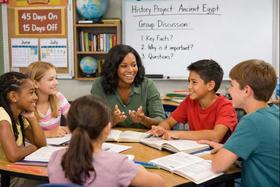Boys And Girls Homes serves 37 students in grades 6-12.
The percentage of students achieving proficiency in math was ≤20% (which was lower than the North Carolina state average of 42%). The percentage of students achieving proficiency in reading/language arts was ≤20% (which was lower than the North Carolina state average of 45%).
The student-teacher ratio of 5:1 was lower than the North Carolina state level of 15:1.
Minority enrollment was 57% of the student body (majority Black), which was equal to the North Carolina state average of 57% (majority Black).
School Overview
Grades Offered
Grades 6-12
Total Students
37 students
Total Classroom Teachers
7 teachers
School Rankings
Math Test Scores (% Proficient)
(12-13)≤20%
42%
Reading/Language Arts Test Scores (% Proficient)
(12-13)≤20%
45%
Student-Teacher Ratio
5:1
15:1
American Indian
5%
1%
Asian
n/a
4%
Hispanic
11%
21%
Black
38%
25%
White
43%
43%
Hawaiian
n/a
n/a
Two or more races
3%
6%
All Ethnic Groups
Graduation Rate
(12-13)≥50%
85%
Eligible for Free Lunch
19%
68%
Eligible for Reduced Lunch (01-02)
22%
8%
School Statewide Testing
School District Name
Source: National Center for Education Statistics (NCES), NC Dept. of Education
Frequently Asked Questions
What percent of students have achieved state testing proficiency in math and reading?
≤20% of students have achieved math proficiency (compared to the 42% NC state average), while ≤20% of students have achieved reading proficiency (compared to the 45% NC state average).
What is the graduation rate of Boys And Girls Homes?
The graduation rate of Boys And Girls Homes is 50%, which is lower than the North Carolina state average of 85%.
How many students attend Boys And Girls Homes?
37 students attend Boys And Girls Homes.
What is the racial composition of the student body?
43% of Boys And Girls Homes students are White, 38% of students are Black, 11% of students are Hispanic, 5% of students are American Indian, and 3% of students are Two or more races.
What is the student-teacher ratio of Boys And Girls Homes?
Boys And Girls Homes has a student ration of 5:1, which is lower than the North Carolina state average of 15:1.
What grades does Boys And Girls Homes offer ?
Boys And Girls Homes offers enrollment in grades 6-12
What school district is Boys And Girls Homes part of?
Boys And Girls Homes is part of Columbus County Schools.
Recent Articles

Year-Round Schooling in 2026: Updated Parent Guide
Explore the latest 2026 data, trends, costs, and parent planning tips in the ongoing debate over year-round schooling vs the traditional calendar.

No Child Left Behind: Past, Present, and Future of U.S. School Policy
Explore how No Child Left Behind evolved into ESSA, what it means for 2025‑26 schooling, and what parents need to know about testing, admissions planning, and funding.

Understanding Public School Fees & Optional Costs Guide
Discover what public school fees are required versus optional, with 2026 updates for parents, students, and educators on budgeting and planning.





